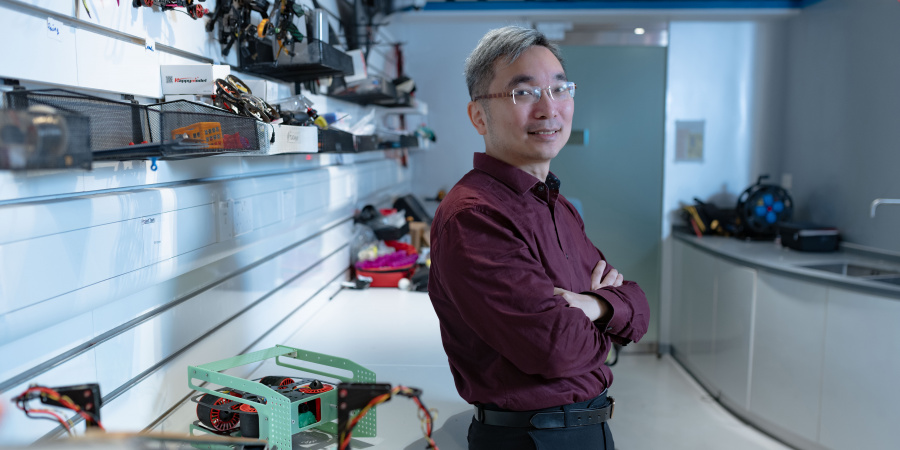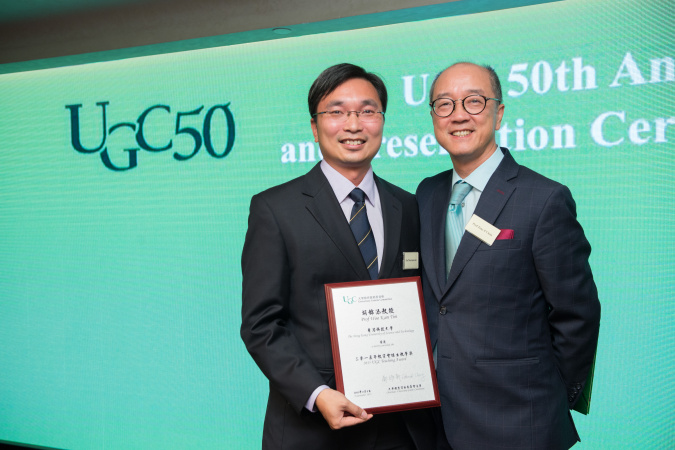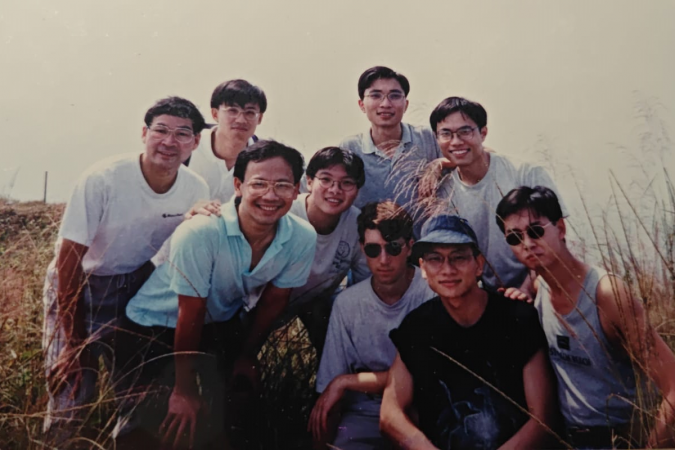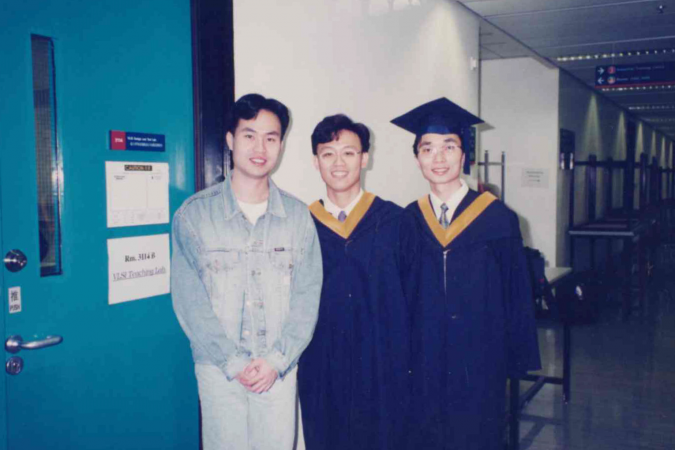An Educator Focusing on Experiential and Service Learning
It was during the first wave of COVID in early 2020 when Prof. Tim WOO Kam-Tim and his HKUST Robotics Team students made the bold decision to continue with their explorations. Observing COVID restrictions and regulations, they broke into smaller sub-groups and took turns to work in the lab around the clock. When the Robocon 2020 Hong Kong Contest was finally postponed from June to September 2020, the Robotics Team members had already enjoyed a five-month head start since other teams had been dormant during the peak of the pandemic. Becoming the champion in Hong Kong and the first-runner up in Asia-Pacific at ABU Robocon Festival 2020, the HKUST Robotics Team showed their can-do team spirit once again.
Prof. Woo, Director of Center for Global & Community Engagement (GCE), Associate Director of Academy for Bright Future Young Engineers as well as Associate Professor of Engineering Education, never fails to motivate students. “Engineers need to stay sensitive to the needs of people to generate designs with societal impact,” stated the home-grown scholar who pursued BEng, MPhil and PhD in the Department of Electronic and Computer Engineering at HKUST. Whether it is about leading undergraduate students to participate in robot design competitions or inspiring primary and secondary pupils via STEAM education, he considers experiential learning essential to the development of hard and soft skills and ultimately how to be an engineer bearing social responsibility.
The making of a socially-responsible engineer
The engineer walks the walk about social responsibility. Growing up as the eldest son in a humble family, he witnessed his street-hawker parents engage in acts of generosity to those in need. As an adolescent who held many part-time jobs to pay for tuition, he actively led and pioneered community services at school which earned his school awards from the Hong Kong Council of Social Service (HKCSS). During matriculation, he debated between social work and engineering as his lifelong career, and ultimately entered engineering school to follow his passion in maths and science. Exemplifying Hong Kong’s signature Lion Rock spirit to work hard and achieve, he continues to have the heart to serve people’s needs.
Experiential and service learning have been emphasized in Hong Kong ever since the introduction of the new four-year undergraduate curriculum in 2012. Back in 2005 however, Prof. Woo, as a pioneer with the belief in multiple competencies which are not confined to academic excellence, had to persuade students to participate. Students’ response grew from zero in the first year to 100% in the third year. In 2008, his students designed a device to alert the elderly to take medication, as well as a Braille printer for the visually challenged. The projects, with real impact, garnered awards from various local and international competitions including the Asia Pacific ICT Alliance Awards.
As he assumed supervisory role of HKUST’s well-known Robotics Team in 2010, his many-faceted efforts in advocating experiential and service learning created increasing synergy. In 2011, the School of Engineering’s Center for Global & Community Engagement was established with him as the Founder Director. Currently with 10 staff members, the Center has a number of enrichment programs offered with engineering professional associations and community organizations for undergraduate students at HKUST. Working hand in hand with the Academy for Bright Future Young Engineers, the Center also organizes activities and competitions for primary and secondary school students to drive STEAM education in Hong Kong.
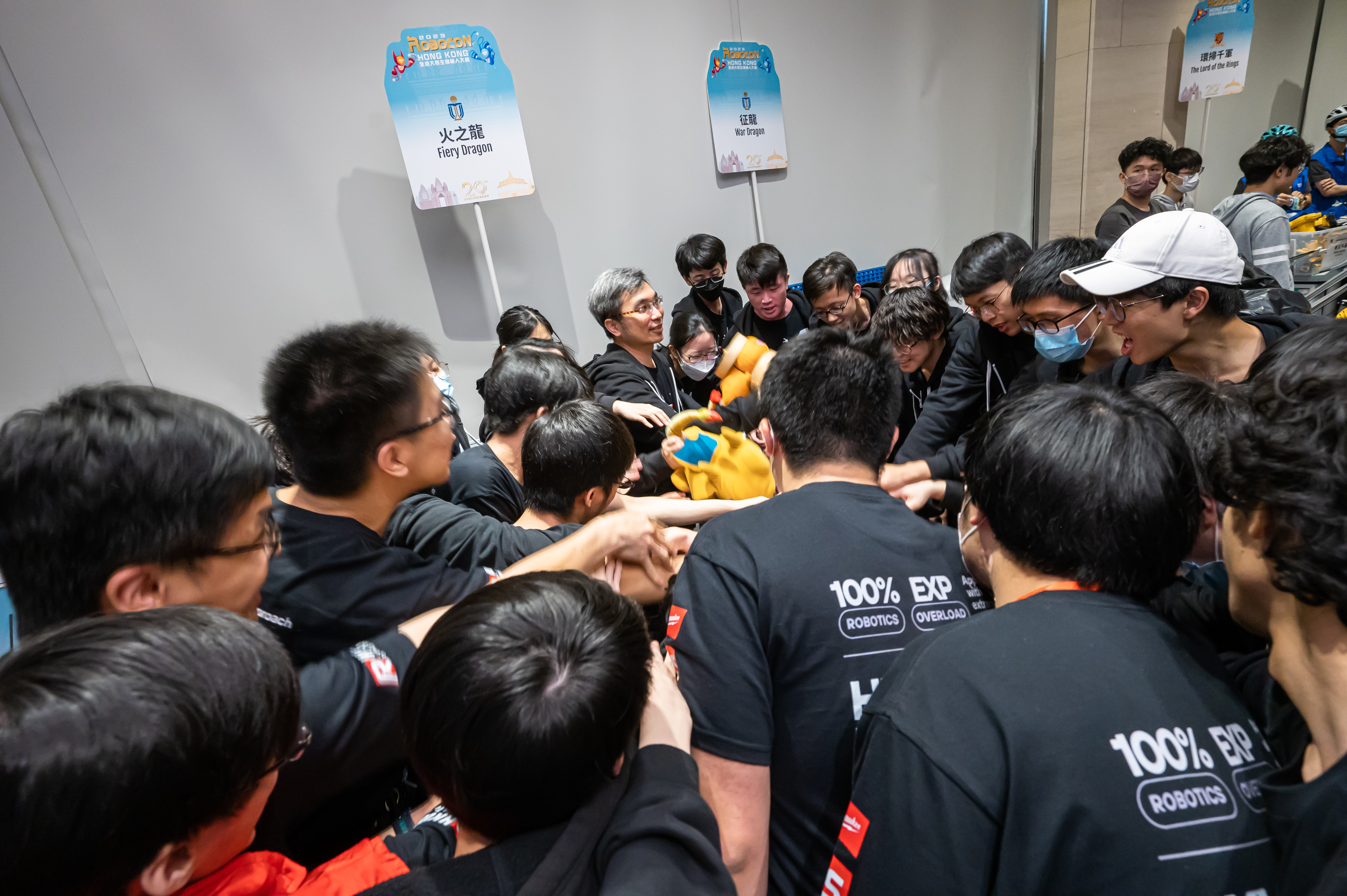
The HKUST Robotics Team has always demonstrated great team spirit in competitions.
Every year, around 120 students are recruited to the Center to undergo special training. Under Prof. Woo’s supervision, students have gained more than 210 awards since 2007. They participate in robotics competitions, engineering design competitions, community design competitions, business plan competitions, student paper contests, final year project competitions, and research competitions.
To promote collaboration among various experiential learning student teams, the Dream Team Hub – a dedicated space on the ground floor of student residential halls 8 and 9 – has made available for the teams’ use since September 2022. It houses HKUST’s four long-standing robotics teams (Robocon, Intelligent Car Racing, Unmanned Aerial Vehicle, and Remotely Operated Vehicle – the four sub-teams under the big HKUST Robotics Team) as well as the younger RoboMaster Team, Red Bird Racing Team, and Aero Team. Whereas the teams used to compete among themselves, Prof. Woo encouraged them to recruit members and share logistics information together to create win-win situations. His goodwill resulted in the three relatively young teams receiving 80% more applications than before, as the total number of applications increased to nearly 340.
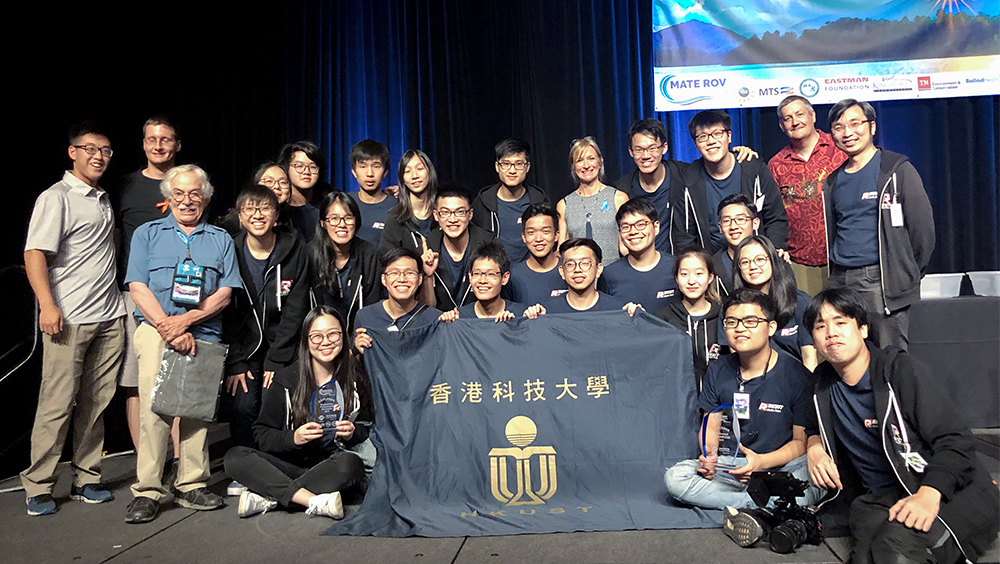
Under Prof. Tim Woo’s supervision, the Robotics Team students achieved numerous major awards over the years, including the All-Around Champion in the Marine Advanced Technology Education (MATE) International ROV Competition in 2019 and 2017.
Meeting COVID challenge
Prof. Woo also inspired the students to meet the COVID challenge. When Hong Kong was hit in the first few months of 2020, he maintained regular online meetings with members of the Robotics Team. There were discussions whether members should continue to work in the lab. Ensuring that all COVID restrictions were observed, Prof. Woo inspired students to reflect whether they joined the team for the competition only, or they were motivated by the desire to learn and solve problems during the process. Ultimately, team members decided to make flexible arrangements to accommodate COVID regulations and work in the lab. They had such close relationships that a new member from Malaysia helped find masks from a factory in Indonesia for members in Hong Kong when the city was severely short of masks. “We are like a family,” said Prof. Woo.
“We were among the very few teams around the world that were still working during COVID. Had the host of the competition called us saying that the competition would resume, we could have been ready immediately.” The competition was ultimately held in September with HKUST winning three accolades, and there had been no COVID case in the lab.
Fostering inclusion via STEAM
The professor is also keen to work with primary and secondary school students, arouse their interest in science, mathematics, and engineering as well as foster their empathy toward others. Under his leadership, the Center has been offering for these age groups the Underwater Robot Competition which is now in its ninth cohort, and the iSTEAM Robotics For Youths Program which has been run for six years.
There was an inspiring story behind. Back in 2013, Prof. Woo was invited by Ebenezer School & Home for the Visually Impaired to give a talk about making underwater robots. The talk generated enthusiastic response and the pupils asked if he could offer a robot-building workshop for them. It turned out that the visually impaired pupils were able to make their own robots within two and a half hours, not much longer than the two hours that students without special education needs (SEN) can finish in general. The pupils went on to take part in an underwater robot competition, competing with non-SEN students, and achieved the First Runner-up. The encouraging news then spread around quickly and more and more SEN schools asked him to offer robot workshops. Instead of facilitating these pupils to participate in external competitions, he decided that HKUST should host its own design competitions for local pupils. In 2015, HKUST hosted its own Underwater Robot Competition for local pupils for the first time.
To foster inclusion, the competition required that teams fulfill at least two of the five criteria: members should come from different grades and genders, and be inclusive of SEN students, ethnic minorities, and the underprivileged. To enhance HKUST students’ communication skills with SEN students, Prof. Woo invited the SEN students’ teachers to provide training to HKUST students so that they can better interact and engage with the participants in the activities. The response had been phenomenal ever since. In 2023 for instance, around 800 applicants competed for 600 places to enter the competition. Some former participants came back proactively and voluntarily as mentors. In 2018, the competition was recognized by the Global Engineering Deans Council (GEDC) as one of the three finalist projects worldwide in the Airbus GEDC Diversity Award – the first time HKUST had such recognition. The award honors the innovative use of technology to increase diversity in engineering education and the 2018 edition had drawn 39 entries from 19 countries and regions.
He is concerned about equal opportunities. “Elite schools and students always have ample opportunities. Rather, for the have-nots, one opportunity means a lot. The competition does not relax its requirements for those with special needs. Yet it is not uncommon that SEN teams or younger teams win over others.” Prof. Woo continued, “Teachers share with me that some students from ethnic minority groups severely lacked confidence, yet after the competition they are able to walk boldly with their heads up. For many of the students, this was the first time they were selected to participate in activities. Education should serve diverse needs of people.”
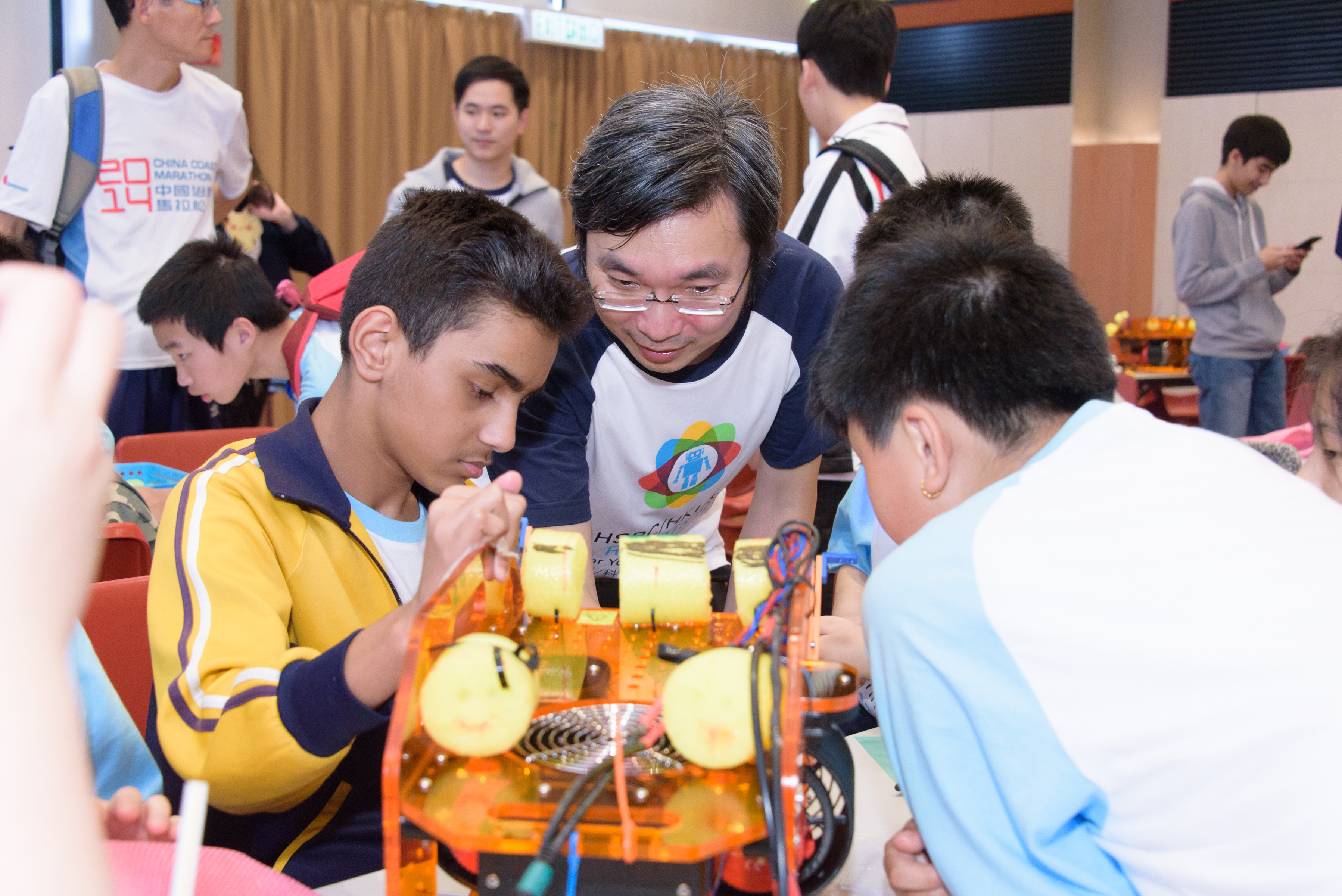
Prof. Tim Woo is keen to promote diversity and inclusion in engineering education among primary and secondary school students.
Offering STEAM education during pandemic
The Center continued to host STEAM activities for primary and secondary pupils despite the pandemic. “The pupils need to continue learning. Our undergraduate students, who are trainers in the STEAM Tutor Team, should not spend their university life online; they need to interact too in order to learn.”
Via Easy Robotics@Home program, HKUST undergraduate students continued to provide training to school pupils and their teachers during COVID. In the first year, learning kits for making underwater robots were mailed to the school teams. There was greater flexibility in the second year when school teams, totaling 500 participants, were guided in groups to use materials available at home, such as coins and aluminum foil.
The Center, via the HKUST venturing team, also produced online videos for pupils and members of the public about how to make underwater robots. Prof. Woo himself was among the performer in the skits that were presented in ways which were humorous and easy to understand. And as part of the STEM@HKUST platform that was established by the University in 2018 with Prof. Woo as a co-founder, STEM videos and articles were generated by HKUST professors on popular science topics such as “Will Plants Get Cancer?”, “The Brain in Love”, etc. “The ‘i’ in our iSTEAM program stands for inclusion,” said Prof. Woo.
Serving diverse needs of people
So why is the engineering professor investing so much time and effort in service learning of undergraduate students, and STEAM education for pupils? “I remember being invited to give a talk at a secondary school, when I casually used the mobile phone as an example of everyday technical device. After the talk, the teacher told me in private that none of these pupils could afford to have mobile phones. I was shocked as that was around 2008 when Hong Kong recorded three mobile phones per person on average.”
Prof. Woo continued, sounding a little emotional. “This was a good reminder that we could not take things for granted. Engineers should have people’s needs in mind in order to design user-friendly products. Learning to be socially-responsible engineers are essential elements of learning to be human. Reflections are the most important. Undergraduate students often discover that they end up learning more from the pupils they teach, than the other way round.” Some of his former students continued with their pursuits to educate young people and design products after graduation.
Having been recognized by three prestigious teaching awards – the University Grants Committee (UGC) Teaching Award, HKUST Michael G. Gale Medal for Distinguished Teaching, and the School of Engineering Teaching Excellence Appreciation Award, Prof. Woo recalled his interview with the UGC. There, he stated that engineers should make a difference to the world by having empathy, which is the clue of experiential and service learning. Skills can be learned via hands-on practice.
His advice to young people who aspire to be engineers: “Make trials boldly, verify carefully. Work hard and do not be calculating; it is only then that you can learn more.”

